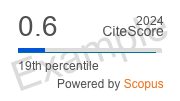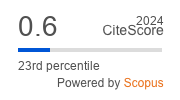Reaction of young physically active men with early repolarization phenomena on a cycle of inhalations of a hypoxic gas mixture
https://doi.org/10.29001/2073-8552-2024-39-3-58-63
Abstract
Aim: To examine a reaction of young physically active men with early repolarization phenomena (ERP) on an inhalation of a hypoxic gas mixture (IHGM).
Material and Methods.17 men (6 with ERP & 11 without it) participated in our study. ECG, echocardiography, clinical blood test and erythropoietin blood test were carried out to every of them initially and on the 1-st and 10-th days after the IHGM.
Results. It was found that end systolic volume was 13,8% more (р = 0,01) and ejection fraction was 8% less (р = 0,01) in ERP group than in non ERP group. These indicators were not change after IHGM. In ERP group on 1-st day after IHGM erythropoietin concentration was 79% more (р = 0,027) and on a 10-th day was 64% more (р = 0,003) than in non-ERP group. In ERP group high fluorescent reticulocyte count on a 1-st day after IHGM was 69% more (р = 0,03) and middle fluorescent reticulocyte count on a 10-th day after IHGM was 13% more (р = 0,04) than in non-ERP group. On a 10-th day after IHGM hematocrit and hemoglobin concentration were 5% (р = 0,01) and 12% (р = 0,01) less than in non ERP group.
Conclusion. Thus, men with ERP have a pronounced reaction of the erythropoiesis system on normobaric hypoxia.
About the Authors
M. V. KabanovRussian Federation
Mikhail V. Kabanov, Senior Research Scientist
27, Bypass Chanel embankment, Saint-Petersburg, 191167
V. N. Nosov
Russian Federation
Victor N. Nosov, Dr. Sci. (Med.), Chief Research Scientist
27, Bypass Chanel embankment, Saint-Petersburg, 191167
M. M. Galagudza
Russian Federation
Mikhail M. Galagudza, Dr. Sci. (Med.), Professor, Corresponding Member of RAS, Director of the Institute of Experimental Medicine; Chief Research Scientist, Institute of Microcirculation and Myocardial Metabolism; Head of the Department of Pathology
2, Akkuratova str., Saint-Petersburg, 197341
A. V. Sizov
Russian Federation
Alexey V. Sizov, Cand. Sci. (Med.), Associate Professor, Department of Faculty Therapy named after V.A. Waldman
2, Litovskaya str., Saint Petersburg, 194100
E. A. Demchenko
Russian Federation
Elena A. Demchenko, Dr. Sci. (Med.), Chief Researcher, NIL Rehabilitation, Head of Scientific and Clinical Association of Rehabilitation; Professor, Department of Internal Diseases
2, Akkuratova str., Saint-Petersburg, 197341
References
1. Chichkova M.A., Svetlichkina A.A., Kovaleva N.A. Electrocardiographic early repolarization syndrome as predictive criterion of arrhythmias of heart at professional athletes. Innovative technologies in science and education. Proceedings of the V International Scientific and Practical Conference. Cheboksary, March 27, 2016; at 2 vol. Cheboksary: Center for scientific cooperation “Interactive plus”; 2016;1(5):83–86. (In Russ.).
2. Limankina I.N. Diagnostic value of J-wave. Emergency medicine. 2013;(1(48)):41–48.
3. Bobrov A.L., Boytsov S.A. State of central hemodynamics in early repolarization syndrome. Journal of Arrhythmology. 2001;(22):30–33. (In Russ.).
4. Kabanov M.V., Nosov V.N., Galagudza M.M., Demchenko E.A. Aerobic exercise capacity of healthy young men with the early repolarization phenomenon. Siberian Scientific Medical Journal. 2021;41(2):92–100. (In Russ.). DOI: 10.18699/SSMJ20210213.
5. Konopka M., Burkhard-Jagodzińska K., Anioł-Strzyżewska K., Krуl W., Klusiewicz A., Chwalbińska A. et al. Prevalence and determinants of the early repolarisation pattern in a group of young high endurance rowers. Kardiol. Pol. 2016;74(3):289–299. DOI: 10.5603/KP.a2015.0133.
6. Горанчук В.В., Сапов Н.И., Иванов А.О. Гипокситерапия. СПб.; 2003:536. Goncharuk V.V., Sapov N.I., Ivanov A.O. Hypoxitherapia. Saint-Petersburg; 2003:536.
7. Antzelevitch C., Yan G.-X., Ackerman M.J., Borggrefe M., Corrado D., Guo J. et all. J-Wave syndromes expert consensus conference report: Emerging concepts and gaps in knowledge. Europace. 2017;19(4):670. DOI: 10.1016/j.hrthm.2016.05.024.
8. Badano L.P., Kolias T.J., Muraru D., Abraham T.P., Aurigemma G., Edvardsen T. et al. Standardization of left atrial, right ventricular, and right atrial deformation imaging using two-dimensional speckle tracking echocardiography: a consensus document of the EACVI/ASE/Industry TaskForce to standardize deformation imaging. Eur. Heart J. Cardiovasc. Imaging. 2018;19(6):591–600. DOI: 10.1093/ehjci/jey042.
Review
For citations:
Kabanov M.V., Nosov V.N., Galagudza M.M., Sizov A.V., Demchenko E.A. Reaction of young physically active men with early repolarization phenomena on a cycle of inhalations of a hypoxic gas mixture. Siberian Journal of Clinical and Experimental Medicine. 2024;39(3):58-63. (In Russ.) https://doi.org/10.29001/2073-8552-2024-39-3-58-63
JATS XML





.png)





























